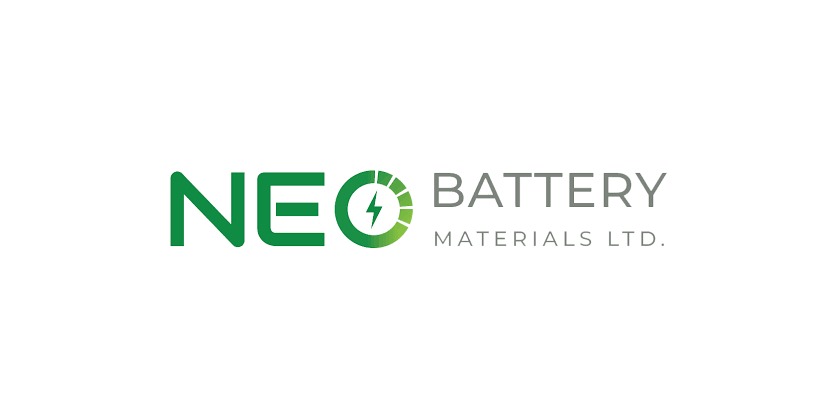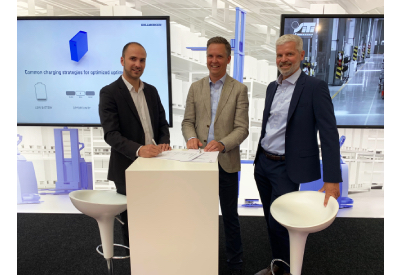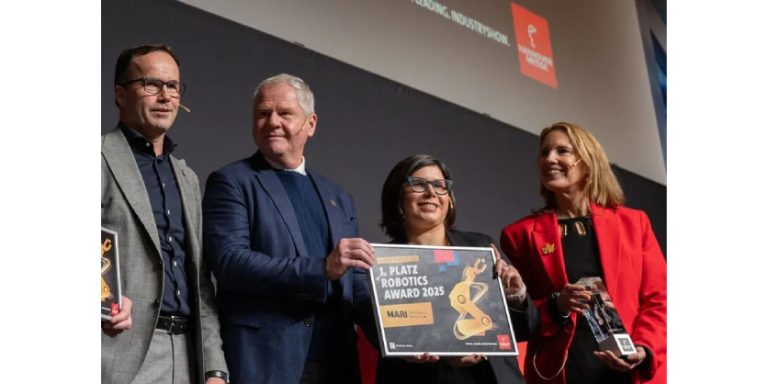NEO Battery Materials Unveils Breakthrough Silicon Battery Capacity, Expanding to Space Industry with Solid-State Batteries
February 13, 2025

- New High-Performance Silicon Anode Product Line: NBMSiDE® P-300
- Breakthrough 43% to 130% Improvement in Initial Battery Capacity Compared to Traditional Graphite Anodes with Less Material Used
- Under Optimization for Pilot Production and Implementation in Full Cells
- Submitted Patent Application to Protect P-300 Manufacturing Know-How
- Expanding Downstream Focus to Space & eVTOL Industries through High Compatibility with Solid-State Batteries
NEO Battery Materials Ltd., a low-cost silicon anode materials developer that enables longer-running, rapid-charging lithium-ion batteries, is pleased to announce the launch of an advanced high-performance silicon anode product called NBMSiDE® P-300 with breakthrough battery capacity. Alongside its core focus on electric vehicles and electronics, NEO is expanding its strategic downstream focus to the space and eVTOL industries through solid-state batteries.
The Advent of P-300: Moving Towards Commercialization with Graphite Anode Blends
On August 13, 2024, NEO Battery Materials announced coating technology innovations that improved battery cycling performance and Coulombic efficiency1. After passing stringent validation tests and exceeding performance thresholds, NEO Battery is delighted to introduce the most advanced silicon anode product called NBMSiDE® P-300.
Using P-300 products, NEO further achieved a technological milestone of manufacturing silicon-graphite composite (mixed) anodes with industry-leading battery capacity results. Initial P-300 silicon-graphite anodes demonstrate a 500 mAh/g capacity by adding under 7% of silicon. This represents a 43% higher initial capacity than traditional graphite anodes, additionally saving 50% of materials compared to competitors’ silicon anodes.
Furthermore, P-300 exhibits good compatibility with graphite and an uncomplicated silicon-graphite ratio control. Hence, P-300 silicon-graphite anodes can easily achieve an 800 mAh/g capacity – a 130% higher initial capacity than graphite anodes. These results signal that P-300 is a strongly favourable candidate for commercial graphite anodes in large cell formats. NBMSiDE® P-300 is now under the optimization process for pilot production and implementation within full cell2 designs and tests.
To protect the proprietary manufacturing know-how, NEO has submitted the related patent application to the Korean Intellectual Property Office (KIPO). Enhanced concepts for engineering silicon particle size through the utilization of key additives during the milling process comprise the core content of the applied patent.
Expanding Focus to Solid-State Batteries for Space and eVTOL Industries
Recent advancements in NBMSiDE® P-300 reinforce that NEO’s products are highly applicable and necessary for solid-state batteries. Solid-state batteries are recognized as the most practical battery systems for the space and electric vertical take-off and landing (eVTOL) industries due to thermal stability with a wide operating temperature range, non-flammable safety, and high energy density.
Mr. Spencer Huh, President & CEO of NEO, commented, “In 2025, NEO Battery Materials is committed to diversifying the applications of our advanced silicon anode technology to capitalize on emerging opportunities in the rapidly growing space and eVTOL industries. These sectors represent significant market potential, driven by increasing demand for lightweight, high-performance, and thermally stable energy solutions. By targeting these transformative industries, along side our existing focus on electric vehicles, NEO aims to position itself at the forefront of innovation, addressing critical challenges and advancing energy storage technology to support the next generation of transportation and aerospace applications.”
As NEO’s products are based on metallurgical, micron-sized silicon with polymer coatings, reducing silicon particle fracturing and adverse side reactions at the electrolyte-electrode interface is essential to mitigate contact loss during cycling tests in solid-state batteries. P-300’s enhanced conductivity and improved lithium-ion diffusion would provide stable performance and high compatibility between pure silicon anodes in solid-state batteries.
1Coulombic Efficiency: Ratio of electrons transferred out from an electrode material/battery during discharging to the number transferred into the material during charging over a full charging cycle (Discharging Capacity-to-Charging Capacity). Ex. If the current discharging capacity is 2,000 mAh/g and the preceding charging capacity was 2,500 mAh/g, the Coulombic efficiency is 80%.
2Full Cell: Lithium-ion battery comprises all four core materials (cathode, anode, separator, and electrolyte). Generally, battery anode materials proof-of-concept and optimization are initiated with half cells in which only the anode, separator, and electrolyte are used with a lithium-metal counter electrode that may supply an infinite number of lithium-ions. Full cells have a limited number of lithium-ions given that commercial-level cathode materials retain trivial amounts of lithium-ions compared to lithium-metal. Consequently, capacity retention is heavily affected by Coulombic efficiency at every charging cycle.
About NEO Battery Materials Ltd.
NEO Battery Materials is a Canadian battery materials technology company focused on developing silicon anode materials for lithium-ion batteries in electric vehicles, electronics, and energy storage systems. With a patent-protected, low-cost manufacturing process, NEO Battery enables longer-running and ultra-fast charging batteries compared to existing state-of-the-art technologies. The Company aims to be a globally-leading producer of silicon anode materials for the electric vehicle and energy storage industries.
More Information
For more information, please visit the Company’s website at: https://www.neobatterymaterials.com/.
Related Story
Rockwell Automation and NEO Battery Materials to Collaborate on Automation of New 240-ton Silicon Anode Facility in North America
Rockwell Automation, Inc., one of the world’s largest companies dedicated to industrial automation and digital transformation, is pleased to work with Toronto, Ontario-based silicon anode active materials company, NEO Battery Materials. The collaboration aims to deliver solutions to aid the battery material manufacturer on its first North American facility, a 240-ton facility with the capacity to grow up to 5,000 tons of silicon anode material per year in Windsor, Ontario.





